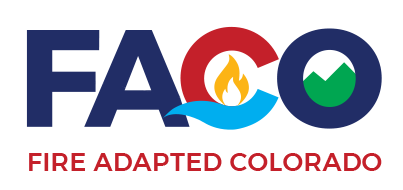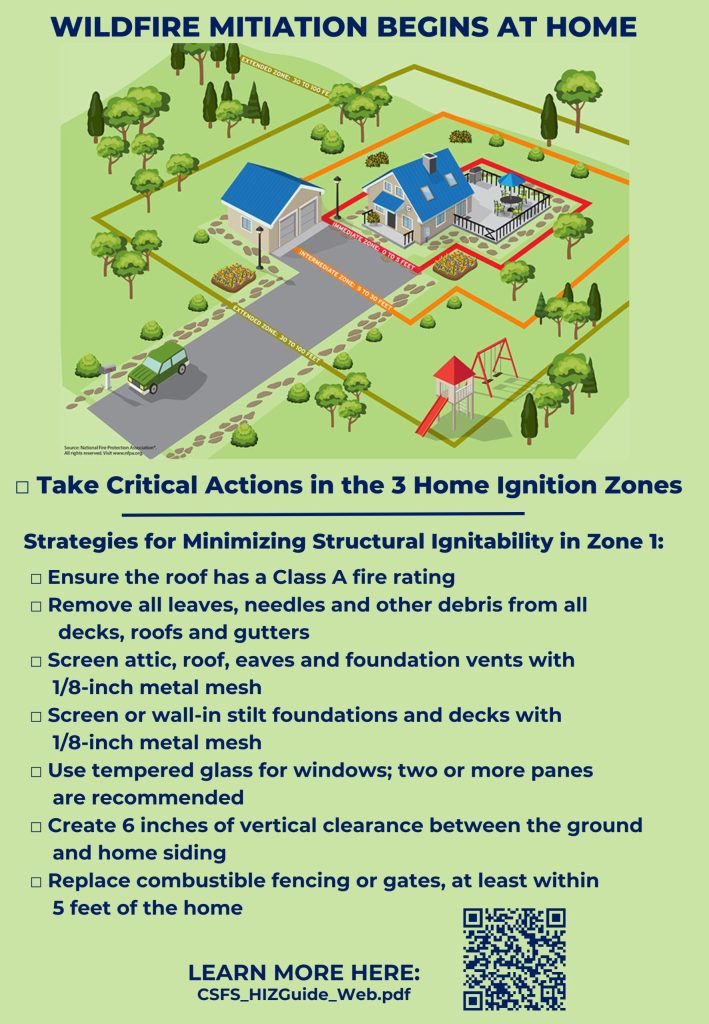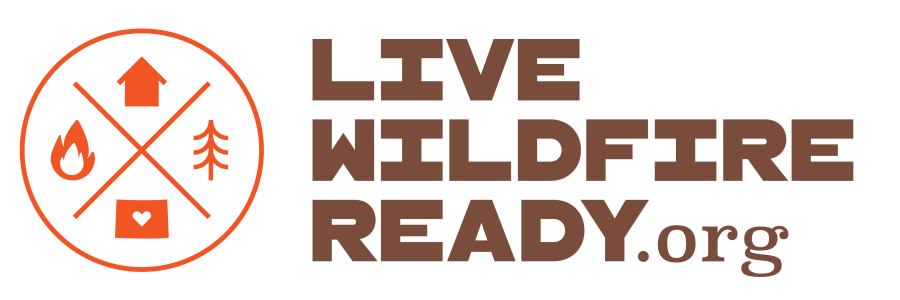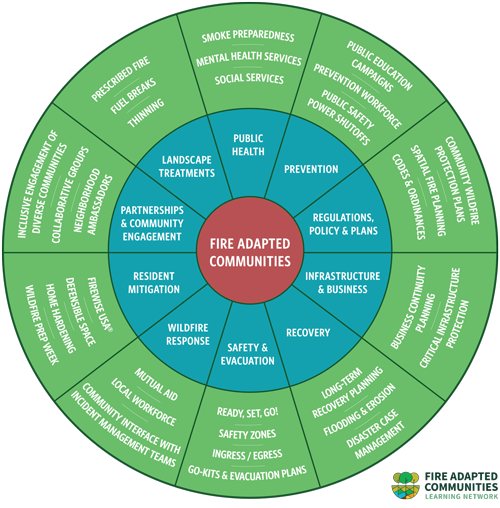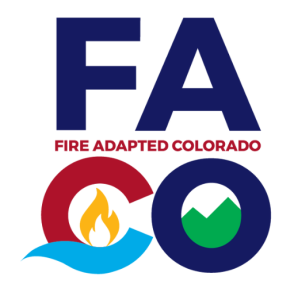RESOURCES
Resources for Residents
Below you will find straightforward resources to prepare your home and family to Live Wildfire Ready.
Colorado Wildfire Mitigation Professionals understand that being prepared for emergencies in Colorado can be daunting. That’s why we are recommending these simple steps you can take to prepare your property and family for a wildfire, or other emergency.
As disasters become more frequent and the threat of wildfire more prevalent in Colorado, it is important to take steps before an emergency, to reduce risk, and to protect your life, health and property. Don’t get caught in the trap of unrealistic expectations when it comes to living with inevitable wildfires in Colorado.
Newsletters
Subscribe to our monthly e-newsletter to receive updated news and timely information about Fire Adapted Colorado activities, statewide updates on wildfire mitigation and resilience efforts and events, legislative updates and how to co-exist with the threat of wildfire in Colorado.
Video Resources
Visit our Smoke Ready resouce section to learn how to protect yourself and your family by preparing for wildfire and prescribed fire smoke in Colorado.
Visit our Wildfire Ready resource section to learn which essential steps you should take now to prepare your family and your property for wildfires in Colorado.
Visit our Resident Mitigation resource section to learn how to harden your home and maintain adequate defensible space around to structures on your property.
Visit this page to learn what you need to know about receiving evacuation notifications where you live and travel in Colorado. It’s more complicated than you may think.
Resources for Practitioners
Below you will find resources geared towards Colorado’s wildland fire mitigation professionals, ….
FAC Framework with Colorado Resources
This graphic was designed by the Fire Adapted Communities Learning Network, to help explain the fire adapted communities (FAC) concept.
Reference the links below for resources for each FAC framework component, including many Colorado tailor-made resources. Remember that every community’s journey to living better with fire is unique.
Designed as an aid for explaining the concept of living with wildfire, this graphic can be downloaded in English and Spanish from FAC Net along with a facilitation guide.
- Disaster Recovery & Continuity Guide (CSBDC)
- Wildfires & Critical Infrastructure (DHS/OCIA)
- Understanding CWPPs in Colorado (CSFS)
- Learn more about CWPPS (CSFS)
- Colorado Forest Atlas – Portal (CSFS)
- Integrating CWPPs into Natural Hazard Mitigation Plans (FEMA)
- Creating a CWPP (FEMA)
- Planning for Hazards: Land Use Solutions for Colorado (DOLA)
- Planning the Wildland-Urban Interface (APA)
- Spatial Fire Planning (USGS)
- Building Code Documents (FEMA)
- Protect Your Home (CSFS)
- NFPA Firewise USA®
- The Home Ignition Zone (CSFS)
- What Motivates Homeowners to Mitigate Wildfire Risk? Lessons from Social Science (RMRS video McCaffrey)
- Community Assessment Template (Wildfire Adapted Partnership)
- Nudging: A Very Short Guide (Harvard.edu)
- Radiant Heat versus Firebrands video (Cohen)
- Future Avoided Costs Explorer: Hazards (CWCB)
- Ready, Set, Go! (IAFC)
- Wildfire Evacuation Check list
- Before an Evacuation (Ready.gov)
- Firefighter Safety Zones (NWCG)
Community Navigators
The USDA Forest Service has started the Community Navigator program to support leaders in historically underserved communities in finding and accessing funding and partnership support. The CNI connects communities to the appropriate resources for building climate resilience when and where they need it most.
Fire Adapted Colorado is working with the Fire Adapted Communities Learning Network, and Coalitions and Collaboratives to provide recourses through this new mentoring initiative.
Resources for Network Participants
Fire Adapted Colorado Network Participants have access to both our public resources and resources curated specifically for the FACO Network. Designed by mitigation specialists, FACO leverages connections to improve the performance and results of its members representing wildfire councils, watershed and fireshed collaboratives, fire departments and districts; and county/local governments working on fire adaptation in their communities.
Leveraging Network Connections
Leveraging the work of others involves using the resources, knowledge, and expertise of other wildfire mitigation specialists to achieve your goals. You can also leverage other people’s abilities to achieve your goals. Building relationships that support the collaborative efforts of these and other partners to create better wildfire outcomes for Colorado communities and landscapes is a key component of transformational social networks, such as Fire Adapted Colorado (FACO), that act as a connecting force in Colorado. It is important to note that leveraging the work of others should be done ethically and with respect for their time and effort.
Engaging with Respect, Leveraging Connections, Expertise and Resources, and Supporting Network Functions are expectations of FACO Network participation. In addition to the many resources in our shared Google drive, participants can connect with others during online networking space, bi-monthly network calls, and topical communities of practice. Benefits of the network include increasing our collective knowledge, discounted learning and exclusive learning opportunities, and capacity building and funding opportunities. Learn more about joining Colorado’s Network for Wildfire Resilience.
Communities of Practice (CoPs) in Colorado
A Colorado Neighborhood Ambassador Approach CoP launched in 2023. This group shares knowledge, resources, progress, and provides peer assistance. In addition, it’s designed to promote expansion of these volunteer efforts throughout the state by working to meet the needs of local coordinators. Learn more here.
A National Neighborhood Ambassador Approach CoP, (with over 100 members who are working to implement a FAC Neighborhood Ambassador in their areas), also meets quarterly on the first Tuesday of the month.
Contact – Lara Thomas FACO | Frequency – Meets quarterly – generally the first Tuesday of Feb., May, Aug., and Nov.
Knowledge sharing, resources, and peer assistance related to starting and running a fire department-based wildland program. Eagle Valley Wildland, West Metro, Vail Fire, others.
Contact – Lara Thomas, FACO | Frequency – Quarterly
The Wildfire Research Center’s Community of Practice is a co-learning and sharing opportunity that brings together past, current, and future WiRē partners. Our meetings are a space for WiRē partners across the country to share technical information and personal perspectives on wildfire mitigation and preparedness, particularly as related to WiRē projects. These discussions range from data presentations to personal reflections on events but always provide an opportunity for us all to learn from one another.
Recognizing the increased economic viability of forest treatments and the relationship to wood product utilization as key components of scaling up forest restoration and reducing negative impacts of wildfire, the Wood Utilization Community of Practice (WUCOP) works to
– Create enabling conditions for forest product utilization from harvest to market, which will result in more cost-effective forest treatments, and more forest treatment opportunities overall, and include:
- optimization of treatment efficiency;
- utilization of all forest treatment tools;
- coordinated development of local, regional national, and international wood markets;
- coordinated development of harvest and processing capabilities;
- and policy recommendations.
– Improve public and decision makers’ understanding of forest treatment benefits vs. costs by:
- advancing systems of valuing watersheds and other ecosystem and public safety services;
- improving cost tracking;
- cost-Avoidance research;
- and tangible benefits’ messaging.
– Learn from and support each other through economic development of forest resilience projects.
Contact – Rebecca Samulski, FACO | Frequency – 4th Thursday, every other month
Branching Out provides a space for meaningful, relevant discussion amongst Forest Collaboratives Network participants. Each session will feature bite-sized stories of successes and failures from forest collaborative coordinators and partners, leaving you with the most relevant details and key takeaways, then offering ample time for small group networking, storytelling, and idea-workshopping.
Contact – Katie McGrath Forest Collaboratives Network | Frequency – Monthly
We foster a proactive approach to wildfire management through regular meetings, discussions, and coordinated efforts. By working together, we aim to develop innovative solutions and improve our collective response to wildfire threats.
Membership in the Colorado Utility Wildfire Consortium is exclusively open to cooperative, public power and investor-owned utilities.
This Community of Practice focuses on topics relevant to non-profit collaborative executive directors (fundraising, organizational administration, stakeholder engagement, more).
Contact – Reach out to Lara Thomas for more information or to enroll| Frequency – Varies.
Network Resources
Visit our Members Only Resource Library, where FACO Network participants contribute and leverage their collective resources; including templates so one doesn’t have to start from scratch, sample plans, research, quick guides, organizational documents, job descriptions, presentations, photos, shared messaging, and more. This curated library is designed to increase efficiency by helping members quickly find knowledge and borrow resources.
Communities of Practice (CoPs)
Fire Adapted Colorado supports several communities of practice, including:
- Neighborhood Ambassador Approach (NAA) CoP
- Wildland Fire Leaders Group
- WiRē CoP
- Wood Utilization CoP
- CFCN Network: Branching Out
-
Colorado Utility Wildfire Consortium
